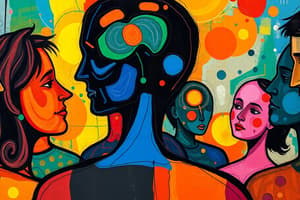Podcast
Questions and Answers
What is the main characteristic of assertiveness?
What is the main characteristic of assertiveness?
- Being hostile and aggressive
- Being confident and direct (correct)
- Being passive and submissive
- Being shy and timid
What are some consequences of lacking social skills?
What are some consequences of lacking social skills?
- Feeling socially connected
- Gaining job opportunities
- Suffering from anxiety disorders and depression (correct)
- Maintaining romantic relationships easily
What is an important aspect of developing better social skills?
What is an important aspect of developing better social skills?
- Lacking practice in active listening
- Showing disinterest in others
- Being indifferent towards others' feelings
- Being empathetic and understanding others' perspectives (correct)
Why is practicing active listening important for improving social skills?
Why is practicing active listening important for improving social skills?
How can body language contribute to effective social communication?
How can body language contribute to effective social communication?
Why is understanding social behavior and improving social skills essential?
Why is understanding social behavior and improving social skills essential?
What is social behavior concerned with?
What is social behavior concerned with?
Which factor has a significant role in influencing social behavior by providing norms and expectations?
Which factor has a significant role in influencing social behavior by providing norms and expectations?
What type of social behavior involves physical and verbal attacks directed towards others?
What type of social behavior involves physical and verbal attacks directed towards others?
How do personal experiences impact social behavior?
How do personal experiences impact social behavior?
Which type of social behavior involves following rules and guidelines set by society or authority figures?
Which type of social behavior involves following rules and guidelines set by society or authority figures?
What is the purpose of confrontational social behaviors?
What is the purpose of confrontational social behaviors?
Flashcards are hidden until you start studying
Study Notes
Understanding Social Behavior and Interactions
Social behavior refers to how people interact with others in their environment. It encompasses various aspects of human interaction, from the simplest gestures to complex social relationships. These behaviors can range from non-human interactions like body posture and eye contact to more advanced forms such as conversation and cooperation. At its core, social behavior is concerned with managing our relationships with those around us.
Factors Influencing Social Behavior
Many factors influence social behavior, including biology, culture, and personal experiences. For example, humans have evolved to form strong bonds with others due to biological mechanisms that promote group living. Culture also plays a significant role because it provides norms and expectations on which individuals base their actions. Personal experiences further shape one's understanding of what constitutes appropriate social conduct, shaping their future interactions accordingly.
Types of Social Behaviors
Different types of social behaviors exist based on the context and purpose behind them:
- Compliance: This involves following rules and guidelines set by society or authority figures within a given context.
- Confrontational: These behaviors occur when there's disagreement between parties over an issue they both care deeply about.
- Aggressive: Aggression includes physical and verbal attacks directed towards another person or group.
- Assertiveness: This type of behavior is characterized by being confident, assertive, and direct when expressing oneself without being hostile or aggressive.
Consequences of Poor Social Skills
Lack of proper social skills can lead to negative consequences such as alienating potential friends, losing job opportunities, feeling socially isolated, suffering from anxiety disorders, depression, and even having difficulty maintaining romantic relationships. Effectively managing these interpersonal dynamics is crucial for thriving personally and professionally.
Developing Better Social Skills
Improving your social skills isn't just about learning the right techniques; it requires consistent practice too. Here are some tips:
- Practice Active Listening: Show genuine interest in others by listening carefully to what they say.
- Be Empathetic: Try putting yourself in other people's shoes to understand where they're coming from.
- Use Body Language: Nonverbals play an important part in social communication - learn how to use them effectively.
In conclusion, understanding social behavior and improving upon your own social skills is fundamental to building stronger relationships, reducing stress levels caused by miscommunications, and enhancing overall wellbeing. Whether you're looking to make new friends or excel at work, honing your ability to connect with others will undoubtedly serve you well throughout life.
Studying That Suits You
Use AI to generate personalized quizzes and flashcards to suit your learning preferences.




